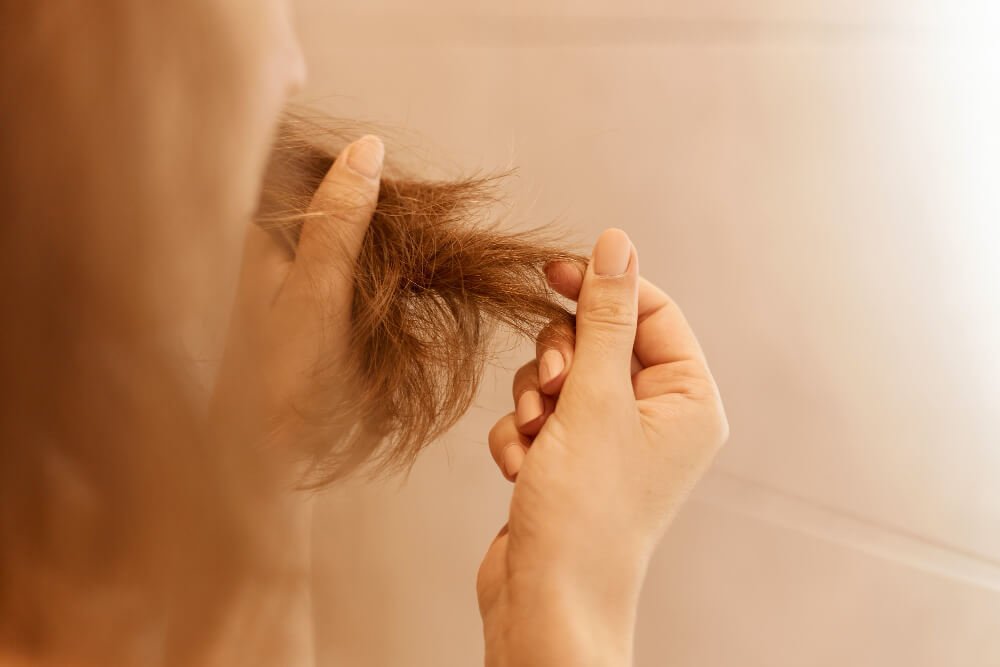Struggling with stress-related hair loss? Learn how to reverse shedding, strengthen hair, and regain your confidence with these science-backed strategies.
Table of Contents
Understanding Stress-Related Hair Loss
Stress has a profound impact on the body, and one of its most visible effects is hair loss. Whether you’re facing sudden excessive shedding or gradual thinning, stress-related hair loss can be a distressing experience. But the good news is that, in most cases, it is temporary and reversible.
Hair loss caused by stress is commonly linked to telogen effluvium, a condition where high stress levels push more hair follicles into the resting phase, leading to increased shedding after a few months. Chronic stress can also disrupt the hair growth cycle, making it harder for new hair to grow back.
If you’re experiencing stress-induced hair loss, don’t panic! With the right approach, you can restore your hair’s health and bring back its natural volume.
This Natural Detox Could Be the Secret to Thicker, Fuller Hair – Tap to Learn More!
How to Identify Stress-Related Hair Loss
Before diving into solutions, it’s crucial to understand whether stress is the real culprit behind your hair loss. Here are some key signs:
- Sudden and noticeable shedding, especially after a stressful event.
- Excess hair fall during brushing, washing, or waking up with hair on your pillow.
- Overall thinning rather than bald patches (which is more common in genetic hair loss).
- Hair appearing weaker, brittle, and less vibrant.
If you’ve noticed these signs, stress may be interfering with your hair growth cycle. Now, let’s explore ways to reverse it.
Managing Stress to Stop Hair Loss
Since stress is the root cause, managing it is the first step in reversing hair loss. Here are some effective techniques:
1. Adopt Relaxation Techniques
- Meditation and Deep Breathing – Helps calm the nervous system and reduces cortisol levels.
- Yoga and Stretching – Encourages relaxation while improving blood circulation to the scalp.
- Journaling and Mindfulness – Writing down your thoughts and practicing mindfulness helps reduce mental burden.
2. Improve Your Sleep Patterns
Lack of sleep increases stress hormones, which can worsen hair loss. Make sure to:
- Maintain a consistent sleep schedule.
- Avoid screens before bedtime to prevent blue light disruption.
- Create a calm nighttime routine to signal your body that it’s time to rest.
3. Engage in Physical Activity
Exercise is a natural stress reliever. Activities like walking, swimming, or cycling release endorphins, which combat stress and improve overall well-being.
The Detox Hair Secret You Didn’t Know You Needed – Click to Reveal What’s Inside!
Nourish Your Hair from Within
Your diet plays a major role in reversing stress-related hair loss. Nutritional deficiencies can weaken hair follicles, making them more susceptible to shedding.
1. Consume Hair-Boosting Nutrients
- Protein – Essential for hair structure. Include eggs, fish, lean meats, and legumes.
- Iron and Zinc – Supports scalp health and strengthens hair strands. Found in spinach, nuts, and red meat.
- Vitamin D and B-complex – Encourages hair regrowth. Get natural sunlight and consume dairy, mushrooms, and whole grains.
2. Stay Hydrated
Dehydration can lead to dry, brittle hair that is prone to breakage. Aim for at least 8 glasses of water per day to maintain healthy hair.
Gentle Hair Care Practices
While addressing internal health, it’s equally important to take care of your hair externally. Avoid harsh treatments and follow a gentle routine:
1. Use Mild and Nourishing Products
- Choose shampoos free from sulfates, parabens, and alcohol.
- Opt for formulas with biotin, keratin, and essential oils.
2. Avoid Heat and Chemical Treatments
Frequent heat styling and chemical treatments (like coloring or perming) weaken hair strands, making them more prone to damage. Try:
- Letting your hair air-dry instead of using hot tools.
- Using heat protectants if styling is necessary.
- Avoiding harsh dyes and bleach.
3. Stimulate Your Scalp
Regular scalp massages enhance blood circulation, delivering oxygen and nutrients to hair follicles. Try:
- Using essential oils like rosemary or lavender for added benefits.
- Massaging with gentle pressure for 5-10 minutes daily.
Hair Thinning? Detox First, Then Grow – Click to Get the Natural Formula That Does Both!
Effective Treatments to Reverse Hair Loss
If your hair loss is severe or persistent, you may need targeted treatments to stimulate regrowth.
1. Topical Treatments
- Minoxidil (Rogaine) – FDA-approved to stimulate hair follicles and promote new hair growth.
- Natural Serums – Some hair growth serums contain peptides and botanical extracts that nourish the scalp.
2. Supplements for Hair Health
Consider biotin, iron, and omega-3 fatty acids to boost hair recovery. Always consult a healthcare provider before starting supplements.
3. Professional Therapies
- Platelet-Rich Plasma (PRP) Therapy – Uses your own blood plasma to rejuvenate hair follicles.
- Low-Level Laser Therapy (LLLT) – Stimulates hair growth by improving blood flow.
When to Seek Professional Help
If hair loss persists despite lifestyle changes, consider consulting a dermatologist or trichologist. They can:
- Determine if other underlying conditions (like thyroid issues) are contributing to the hair loss.
- Recommend customized treatments based on your specific case.
- Provide medications or advanced therapies if needed.
Final Thoughts: Be Patient and Stay Consistent
Reversing stress-related hair loss takes time, but with the right approach, your hair can regain its natural strength and vitality.
- Manage stress through relaxation, better sleep, and exercise.
- Adopt a hair-friendly diet rich in protein, iron, and vitamins.
- Use gentle hair care products and avoid harsh treatments.
- Consider proven treatments like minoxidil, PRP therapy, or scalp massages.
- Seek medical advice if hair loss persists.
Remember, your hair is a reflection of your overall health—nurture your body, and your hair will thank you!

